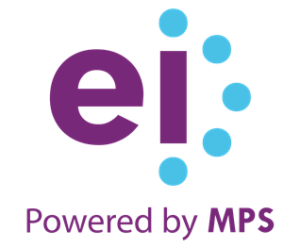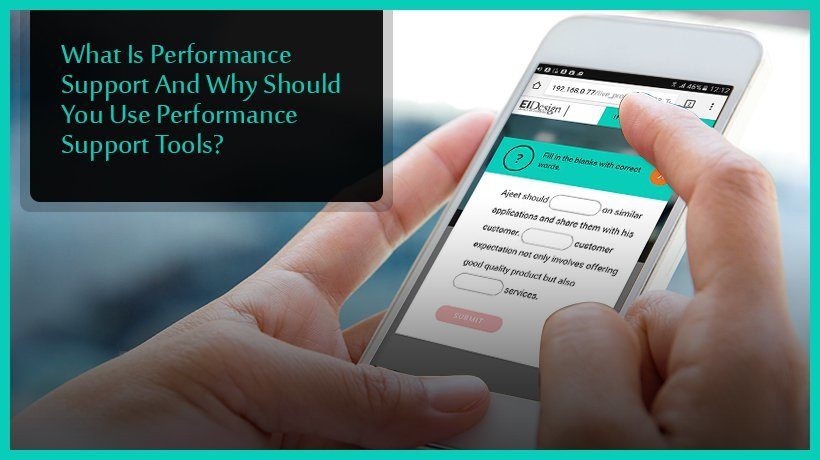Why You Should Use Performance Support Tools
According to the 70:20:10 model for Learning and Development, we learn:
- 70% from on the job experiences (experiential learning).
- 20% from interactions with others (social learning).
- 10% from formal (structured learning).
As we note from this model, organizations need to focus more on the informal and social learning aspects to effectively achieve their learning mandates.
Let’s first understand what exactly Performance Support Tools (PSTs) are and why you should invest on them.
What Are Performance Support Tools (PSTs) And How Can They Be Used?
Performance Support Tools or PSTs are learning aids meant to help employees with on-the-job support at the precise moment of their need. They are designed to support and guide employees when at work.
They are easily available and usually embedded directly into the learners’ workflow helping organizations provide the required task support and up the productivity quotient of their employees.
Specifically:
- They are a great fit for informal learning.
- They can be also be used to support formal training to improve the stickiness of learning and its eventual application on the job.
- PSTs accelerate learning as they are part of the learner’s work-flow and are available precisely at the time of their need. They are designed to be easy to assimilate and easy to apply.
- You can integrate microlearning-based strategies to create them and see the application levels zoom.
- Couple them with platforms for social learning and you will see the impact of your training multiply.
Why Does It Make Business Sense For Organizations To Invest On Performance Support Tools?
If I were to ask you what you had for breakfast today, your reply would be an instantaneous one. It isn’t quite going to be the case if I ask what you had for dinner a month ago. We’re creatures who keep forgetting things!
As a matter of fact, we forget 80% of what we learned in 30 days as shown in this diagram featuring the “Forgetting Curve” by Herman Ebbinghaus, a German Psychologist.

Formal learning, as you may be aware, takes place for a few days in a year. Now view this from the prism of the Forgetting Curve and you’re bound to have second thoughts about your investments on using only formal training to make the kind of impact you’d like on your learner performance.
So What’s The Way Forward?
A great way to address this challenge is to have a blend of both formal and informal training and offer a solution that treats “Learning as a continuum”.
Here’s what you can do:
- Ascertain the portions from your formal training program that you want your learners to remember, check, refer or apply, and use Performance Support Tools (PSTs) to reinforce those messages.
- Design your PST nuggets to be stand-alone assets aligned to specific learning outcomes.
- Weave your training nuggets into a “learning path” and keep the knowledge thread relevant and in appropriate order over the course of your identified training period.
- Combine the power of reinforcement with new assets for higher recall, retention, and application of the knowledge gained on-the-job.
The result? You’ll be able to see a dip in your formal training costs and an increase in learner productivity and performance.
How Do Performance Support Tools Help Learners?
Performance Support Tools (PSTs) are informal in nature and much to the learners’ liking, they help them learn and work simultaneously. Performance Support Tools (PSTs) are a learners’ delight as they:
- Help them perform their tasks without having to seek external help.
- Cut down on time that would otherwise have been wasted by experienced employees helping the lesser experienced employees.
- Help new employees complete their tasks in quick time and with the desired quality, especially when formal training is not available.
- Can be used to help new employees understand complex tasks and processes in a simplified way.
- Are a great way to learn about new systems, upgrades, or when something is being introduced afresh in the workflow/process.
What Are The Possible Ways To Offer Performance Support Tools?
There is no dearth of options when it comes to offering Performance Support Solutions. At EI Design, we offer Performance Support Tools in various formats, including:
1. Mobile Apps.
Mobile Apps and just-in-time information go hand in hand. They are an ideal way to offer Performance Support at the time of learners’ need – anytime, anywhere.
2. Videos And Interactive Videos.
If you had to unpack and start operating your brand new camera and you’re not sure how to go about it, what would you choose – leafing through the manual or a three-minute YouTube video? Most modern day learners opt for the latter. All the more reason for you to leverage on videos and interactive videos to offer Performance Support when your learners are stuck and need help!
3. Decision Making Scenarios.
Learners keep encountering complex situations at work. You can make their life easier through short branching scenarios helping them practice their way out of tough situations and take decisions in a risk-free environment to bring about application of learning on-the-job.
4. Whiteboard Animations.
Animations and illustrations help you say things you would otherwise find difficult to convey. Their innate ability to incite the lighter side in your learners goes a long way in conveying important messages and long-term retention of that information.
5. Kinetic Text/Animations.
True, a picture speaks more than a thousand words. But you don’t need a thousand words every time to say what you want to say. Sometimes, just a few words do the job – especially when they’re set in motion and animated. If text is all you’ve got and the concept you want to convey is not that easy to visualize, Kinetic Text/Animation is what you should be looking at. You can club it with background music or a voice over and the impact will be there for you to see.
6. Interactive PDFs.
Got information locked in lengthy documents? You can convert them into interactive PDFs, provide a user-friendly navigation, and add some visual appeal to please the eye. They’re a great format to help learners go through factual and knowledge-based information quickly and easily. Using this format, you can offer your learners tips, fact sheets, checklists, practical forms, participant guides, processes, and procedure documents.
7. eBooks.
You can convert your documents into HTML5 compatible eBooks and make them multi-device compatible. They can also be converted as SCORM packages. You can package key information in your eBooks in the form of key takeaways from a training program, participant guides, processes, and procedure documents.
8. Expert Videos, Webinars/Recorded Webinars.
Experts carry that aura around them, don’t they? Irrespective of whether it’s a classroom tutor, eLearning guide, or workplace mentor, learners treat them with respect and value their insights. You can offer Performance Support to your learners in the form of expert videos and videos of webinar recordings. You can also track your learners’ performance through assessments with SCORM packaging.
9. Webcast/Podcasts.
These are short episodes of audio or video that learners can download on their device and watch/listen to when traveling, waiting for an appointment, or any other occasion to kill time. They find a lot of takers as they are brief and entertaining. You can use these formats to offer Performance Support at the time of learners’ need as they can be watched/listened to on-the-go.
You can also take a look at this video on the different formats that you can use to offer Performance Support:
What More Is Possible?
As we saw, the organizational learning strategy needs to focus on ways and means to enhance on-the-job learning. Performance Support Tools (PSTs) help you achieve this mandate.
PSTs can be aligned easily to your other key learning strategies like:
- mLearning or mobile learning (by making PSTs in mobile-friendly formats).
- Designing learning for the millennial generation (innovative formats of PSTs can be aligned to the way Millennials learn).
- Gamification.
- Micro portals.
I hope this article provides you with the required insights on Performance Support Tools (PSTs) and why you should use them. Do contact me if you need any specific support to integrate Performance Support in your learning strategy.










